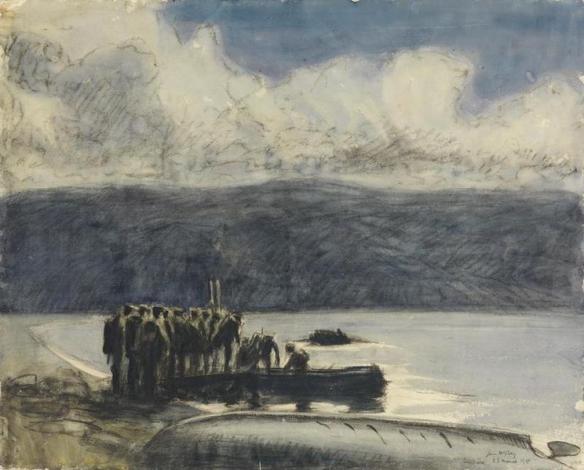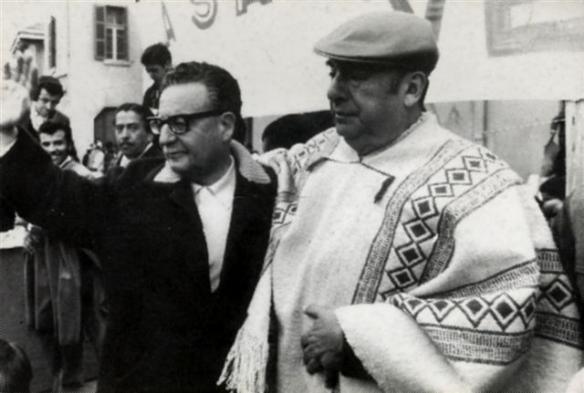"Neruda" from issue 295.2

Neruda
When the moon was just beginning to rise—
he could smell the sea from a considerable distance,
a scene from the Mediterranean. Neruda,
lighting a smoke, the men
rolling their nets like their fathers before them.
I don’t know what he brought back on that cold December morning:
a ball of string, a cup of grass,
a flower blowing across the graves
when he was forced to leave his house
in the middle of the night,
rain soaking his shirt,
peasants slashing a path through the mountains.
Whatever it was—he meant to keep them:
scraps of paper,
poems—stashed in his boots.
—Jacqueline Marcus
Not long ago, after Venezuelan President Hugo Chávez died, I wrote a piece for Truthout.org titled, If Democratic Leader Hugo Chávez was a Dictator, as U.S. Media Claims, Why Do Millions of People Love Him?
Although this essay is about Hugo Chávez, it indirectly explains why the Chilean poet, Pablo Neruda, was forced to leave his country. By that I mean the United States government was, and still is, in the business of overthrowing egalitarian, social democracies to suit the needs of U.S. corporate interests. The people are not permitted to question corporate rule.
Pablo Neruda would have embraced Hugo Chávez for the very same reasons that he loved and admired Salvador Allende, Chile's first socialist president in 1970. Under President Nixon, the U.S. covertly planned a brutal military coup led by the dictator General Augustine Pinochet against the people’s consent, and at the disposal of Chile’s democratic elections. Pinochet took power in a U.S. supported coup d'état on, coincidentally, September 11th, 1973, and ruled Chile for 17 years. During that time his government murdered or disappeared thousands of Chilean farmers, artists, journalists-writers, and working families, including children. Tens of thousands were imprisoned and tortured.
During a search of his house at Isla Negra by Chilean armed forces, Neruda famously remarked: "Look around—there's only one thing of danger for you here—poetry."
Pablo Neruda was opposed to imperialistic occupations of South American resources. He was a champion for the poor, and for social justice. That is why Chilean capitalists that represented U.S. corporate interests put his name on a “hit list”. The people, however, loved Pablo Neruda not only for his poetry, he had a clear understanding that in the name of “democracy and freedom,” the corporate elitists raped Chile’s resources for profits for the few, such as the United Fruit Company, while farmers and workers were forced off their family-owned lands, reducing the majority of Chileans to poverty-wage conditions. Moreover, under corporate control, protected by U.S. forces, Chile’s agricultural lands were depleted and polluted with U.S. herbicides or toxic chemical poisons.
Neruda stood with the people. He despised the totalitarian capitalists for enforcing brutal policies of inequality that enriched the few and the expense of the many. That is why Chilean workers saved his life and helped him to escape: miners, farmers, and friends passed him from one house to the next late at night through South American countries, crossing the Andes on horseback to Mexico.
Due to U.S. government-corporate propaganda, young American students have been taught to demonize socialism, but they should know that unlike corporatism, socialism is actually a humane form of capitalism: it is not communism. Socialists believe that the people have a right to own their own businesses and farms, a right to fair wages and decent working conditions, a right to a free college education and universal health care, all of which could be easily guaranteed with a mere twenty percent of the revenue made from U.S. oil profits, for example.
Neruda would be appalled to learn that American tax dollars are primarily financing billionaire weapon contractors, war profiteers, Homeland Security and surveillance agencies at the cost of $1 trillion taxpayer dollars a year when those tax dollars are supposed to be funding social security, health care, protection of environmental resources with clean renewable energy, infrastructure maintenance, public education, child care for working American families, in short, decent living standards.
So if you want to know the story behind Pablo Neruda’s politics, then read this essay on Hugo Chávez and you’ll get an idea of what he was up against regarding U.S. corporate policies and their military coups. In fact, the U.S. government, via the CIA., is currently creating havoc in Venezuela, a CIA practice known as the “shock doctrine” in the words of Naomi Klein, to put an end to the successful policies of socialism established under Hugo Chávez. Iraq, of course, is one more example of raiding a country for its resources viz. oil in the name of “democracy and freedom”, and you can throw in Afghanistan for control of the poppy fields (opium), natural gas and oil pipelines.
For students who are interested in learning more about U.S. foreign intervention in South America, I highly recommend two classic films: Oliver Stone’s “Salvador” (1986), and Costa-Gavras’ “Missing” with Jack Lemmon and Sissy Spacek.
Jacqueline Marcus’ first collection of poems, Close to the Shore, was published by Michigan State University Press. Her poems have appeared in The Kenyon Review, The Ohio Review, The Antioch Review, The Journal, Hotel Amerika, Verse Daily, The North American Review, The New Delta Review, The Tampa Review and more. Her second collection of poems, Summer Rains, is under review at Salmon Poetry Press. She is a contributing political writer for BuzzFlash.com at Truthout.org. She taught philosophy at Cuesta College, San Luis Obispo, California, and is the editor of For Poetry and Environmental Press. Jacqueline was featured in issue 295.2.
If Democratic Leader Hugo Chávez was a Dictator, Why Do Millions of People Love Him? Buzzflash-Truthout.org.
Images: Wikimedia Commons & Google/free images
Recommended
Nor’easter
Post-Op Appointment With My Father
Cedar Valley Youth Poet Laureate | Fall 2024 Workshop






